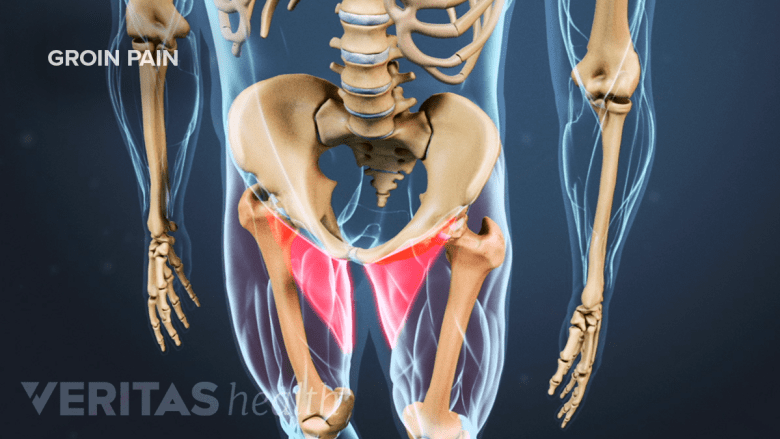The symptoms of hip impingement can vary from person to person, but tend to arise gradually, over days, weeks, and months. Exercise is not a cause of hip impingement, but it can make symptoms worse.1Byrd JWT. OrthoInfo, American Academy of Orthopaedic Surgeons. Last reviewed November 2016. Accessed June 2, 2017.

Pain around the hip and groin area are classic symptoms of hip impingement.
In This Article:
The symptoms of hip impingement, including hip pain and decreased range of motion, are described in detail below. People experiencing severe hip pain and people who have mild to moderate hip pain lasting more than a few weeks are encouraged to contact a medical professional.
Hip Pain
People with hip impingement often report:
- Intermittent pain in or around the hip and groin. This pain will come and go with certain activities. Over time the pain may become more frequent.
- Sharp pain in the groin after certain movements, such as:
- Squatting down
- Twisting
- Pivoting, particularly pivoting to the affected side
- Getting into or out of a car
- Sitting down or getting up from a chair
- A dull ache at the hip or groin when at rest, particularly after:
- Prolonged sitting
- Prolonged walking
- A workout
A person with hip impingement may have one, some or all of these painful symptoms. For example, one person may experience intermittent pain during workouts and when pivoting. Another may only feel a dull ache after a long walk.
Additional Hip Impingement Symptoms
In addition to hip pain, a person with hip impingement may experience:
- Loss of range of motion, particularly when rotating the hip inward or moving the leg toward the centerline of the body.
- Stiffness around the hip, making movements slower or more difficult.
- Trouble going up stairs. Changes to the hip’s range of motion may change a person’s natural gait while climbing stairs.2Diamond LE, Dobson FL, Bennell KL, Wrigley TV, Hodges PW, Hinman RS. Physical impairments and activity limitations in people with femoroacetabular impingement: a systematic review. Br J Sports Med. 2015;49(4):230-42.
- Decreased muscle strength around the hip.3Freke MD, Kemp J, Svege I, Risberg MA, Semciw A, Crossley KM. Physical impairments in symptomatic femoroacetabular impingement: a systematic review of the evidence. Br J Sports Med. 2016;50(19):1180.
- A loss of balance. Balancing on the affected leg may be more difficult than balancing on the unaffected leg.3Freke MD, Kemp J, Svege I, Risberg MA, Semciw A, Crossley KM. Physical impairments in symptomatic femoroacetabular impingement: a systematic review of the evidence. Br J Sports Med. 2016;50(19):1180.
- Limping. In moderate to severe cases of hip impingement, hip pain and other symptoms may cause a person to walk with a limp.
Most people experience a loss of range of motion in the hip. The other symptoms may or may not occur depending on the severity of the impingement and how long it has gone untreated.
- 1 Byrd JWT. OrthoInfo, American Academy of Orthopaedic Surgeons. Last reviewed November 2016. Accessed June 2, 2017.
- 2 Diamond LE, Dobson FL, Bennell KL, Wrigley TV, Hodges PW, Hinman RS. Physical impairments and activity limitations in people with femoroacetabular impingement: a systematic review. Br J Sports Med. 2015;49(4):230-42.
- 3 Freke MD, Kemp J, Svege I, Risberg MA, Semciw A, Crossley KM. Physical impairments in symptomatic femoroacetabular impingement: a systematic review of the evidence. Br J Sports Med. 2016;50(19):1180.

